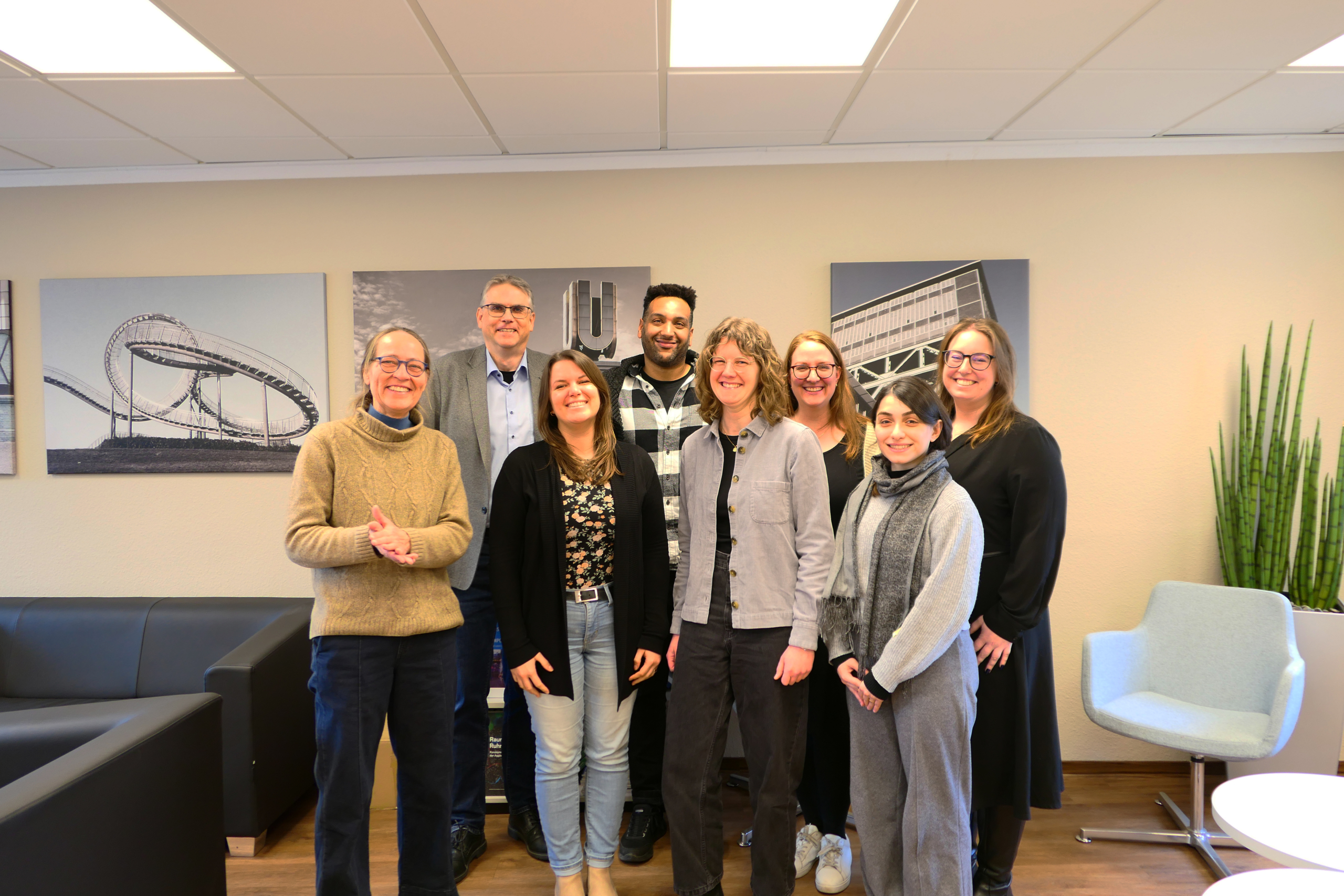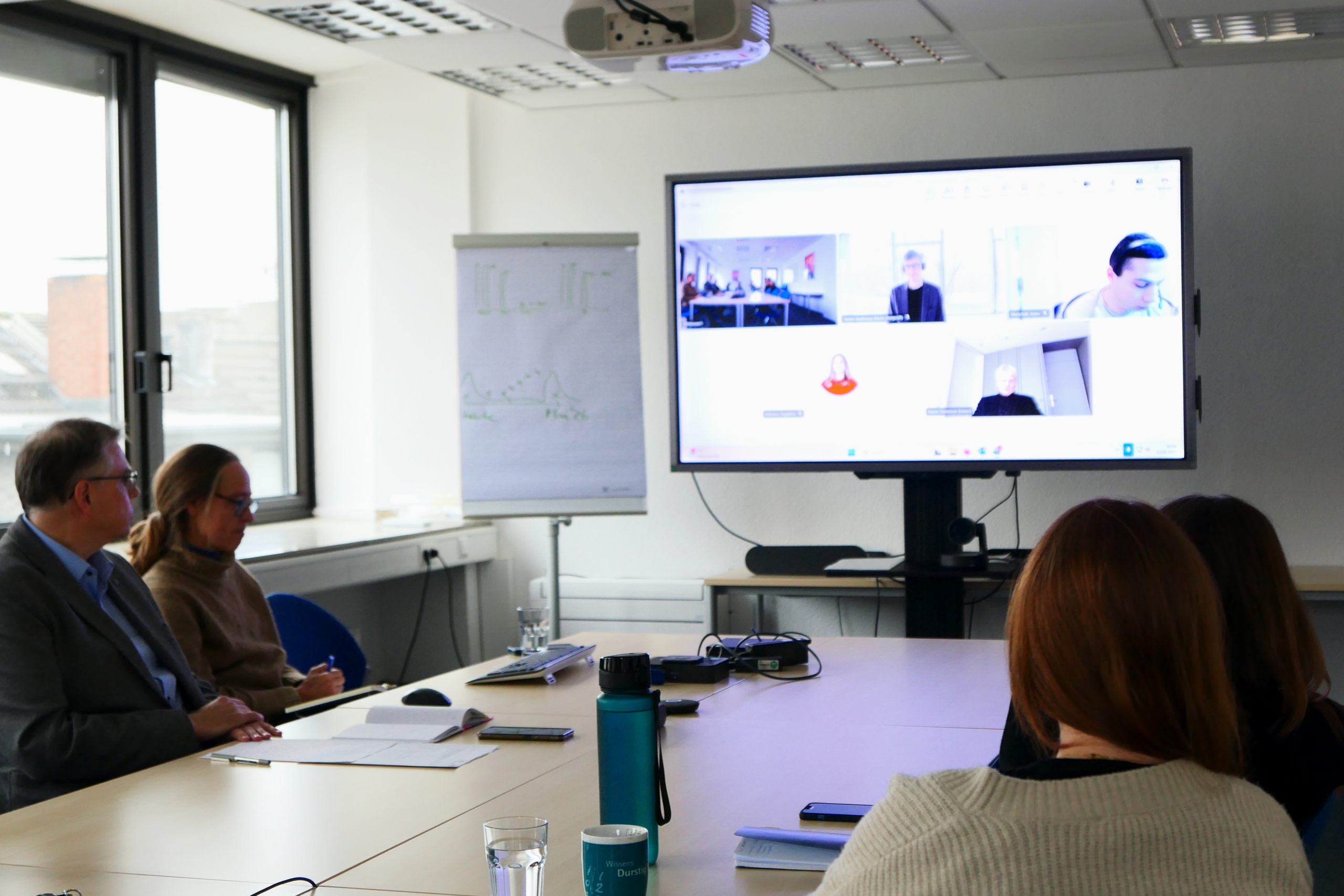Zeitz, Jana Friederike
Jana Friederike Zeitz, M.Sc. Geography
(area of specialisation: Urban and Regional Development Management)

Studied Geography with specialisation on Urban and Regional Development at the Department of Geography, Ruhr University Bochum.
Research interests:
- The right to the city
- Social and spatial inequality
- Urban and neighbourhood development planning
- Housing market and allocation strategies
Contact:
Phone: + 49 (0) 231 9051-244
E-Mail: jana.zeitz@ils-research.de
100. Promovierenden-Kolloquium am ILS
Mit dem 100. Promovierenden-Kolloquium feierte das ILS – Institut für Landes- und Stadtentwicklungsforschung – am 13. Januar 2026 ein besonderes Jubiläum . Seit 2009 ist das regelmäßig stattfindende Kolloquium ein zentraler Baustein der Nachwuchsförderung am ILS und bietet Promovierenden einen Raum für Austausch, Diskussion und wissenschaftliche Weiterqualifizierung.Das Promovierenden-Kolloquium ist Teil der umfassenden Bemühungen des ILS, seine Promovierenden bestmöglich zu unterstützen. Dabei entstehen die meisten Promotionen im Zuge der Forschungsarbeiten am ILS. Neben dem Kolloquium werden die Promovierenden auch individuell begleitet, unter anderem über Promovierendenvereinbarungen und weitere Unterstützungsangebote.
Promovierende sind ein zentraler Pfeiler der Nachwuchsförderung an wissenschaftlichen Einrichtungen wie dem ILS. Neben der Diskussion der jeweiligen Promotionsvorhaben werden im Kolloquium regelmäßig weitere für den wissenschaftlichen Werdegang relevante Themen aufgegriffen. Dazu zählen unter anderem das Promovieren im Ausland, der Umgang mit Reviewer-Rückmeldungen, Wissenschaftskommunikation, Informationsangebote zu Bibliotheken sowie Diskussionen zur Wissenschaftspolitik. „Das Promovierendenkolloquium ist für uns Doktorandinnen und Doktoranden eine große Unterstützung auf unserem Weg der wissenschaftlichen Qualifikation”, so Ann-Kristin Steines, Sprecherin der Doktorand*innen am ILS.
Gegründet wurde das Promovierenden-Kolloquium im November 2009vom damaligen ILS-Direktor Prof. Dr. Rainer Danielzyk, anschließend vom wissenschaftlicher Direktor Prof. Dr. Stefan Siedentop bis 2023 weitergeführt. Beide waren Gäste des 100. Kolloquiums und berichteten aus ihren jahrzehntelangen Erfahrungen in der Betreuung von Promovierenden. Seit 2024 wird das Promovierenden-Kolloquium von Prof. Dr. Thomas Weith geleitet. Aktuell nehmen am ILS regelmäßig rund 15 bis 20 Promovierende und Promotionsinteressierte an dem Kolloquium teil.
Die Bilanz der vergangenen 15 Jahre unterstreicht den Erfolg des Formats: Insgesamt wurden in diesem Zeitraum 31 Promotionen abgeschlossen, davon 16 Promotionen an der Fakultät Raumplanung der TU Dortmund. Ebenfalls bemerkenswert ist der hohe Anteil von Frauen: 22 der abgeschlossenen Promotionen wurden von Wissenschaftlerinnen erfolgreich abgeschlossen.
Auch Auszeichnungen und Karrierewege zeigen die nachhaltige Wirkung der Nachwuchsförderung am ILS. So erhielt Dr. Kerstin Conrad 2024 den JRF-Dissertationspreis. Zudem führte dieser Qualifikationsschritt bei vielen zu einer Weiterbeschäftigung als Postdoc am ILS und bei rund einem Fünftel der Promotionsabschlüsse später auch zu ersten (Junior- oder Vertretungs)professuren.
Das 100. Promovierenden-Kolloquium markiert damit nicht nur ein Jubiläum, sondern steht exemplarisch für das kontinuierliche Engagement des ILS in der Förderung des wissenschaftlichen Nachwuchses.
Weitere Informationen zur Nachwuchsförderung am ILS finden Sie hier.
Segregation in primary schools and the production of inequality
ILS researcher Isabel Ramos Lobato, together with other colleagues, has published an article in the journal sub/urban. This article examines the causes of primary school segregation in a large city in North Rhine-Westphalia. Segregation in primary schools and the production of inequality. In many German cities, there is a serious degree of segregation at primary school level. This is problematic since primary schools are a key determinant of social mobility and social cohesion. Based on a combination of quantitative and qualitative data, our findings show how spatial, individual, and institutional factors, as well as their interactions, contribute to the emergence and reinforcement of school segregation. This illustrates the complexity of segregation processes within the education system. A better understanding of these interactions is essential not only from a scientific perspective, but also to enable the implementation of targeted measures to alleviate school segregation. https://doi.org/10.36900/suburban.v13i2/3.1025. Further current selected papers can be found here.
Arbeiten im ILS: Studentische Mitarbeit in den Projekten „Agrarsysteme der Zukunft“ und „FoodConnectRuhr“
Die Forschungsgruppe Raumbezogene Planung und Städtebau sucht ab März diesen Jahres studentische Unterstützung in den Projekten “Agrarsysteme der Zukunft” und “FoodConnectRuhr”. Beide Stellen umfassen jeweils 9 bis 12 Wochenstunden. Die zu bearbeitenden Themen umfassen die nachhaltige Transformation von Agrar- und Ernährungssystemen mit besonderem Fokus auf regionale Lebensmittelwertschöpfungsketten, zukunftsfähige Agrarsysteme, Stadt-Land-Beziehungen sowie Anpassungsstrategien an den Klimawandel. Weitere Informationen zu den konkreten Aufgaben stehen in der Stellenausschreibung.
Fachwissen frei zugänglich machen
Die im oekom Verlag erscheinende Fachzeitschrift „Raumforschung und Raumordnung | Spatial Research and Planning (RuR)“ geht auf ihrem goldenen Weg der Publikationspraxis den nächsten Schritt und wird ab 2026 als Diamond Open Access-Zeitschrift erscheinen. Diamond Open Access (OA) bedeutet, dass Publikationen oder Publikationsplattformen für alle Interessierten weltweit kostenlos zugänglich sind; für die Autor*innen fallen keine Kosten für die Publikation an. Damit setzt Diamond OA den Open Access-Gedanken konsequent um. Zur Pressemitteilung
Pressemitteilung
Urbanen Wandel verstehen, urbanen Wandel gestalten
ILS richtet mit der Forschungsstrategie 2025+ seinen Kurs aus
Wie lassen sich Städte und Regionen angesichts von Klimakrise, sozialer Ungleichheit und tiefgreifendem Strukturwandel zukunftsfähig gestalten? Mit der Forschungsstrategie 2025+ schärft das ILS – Institut für Landes- und Stadtentwicklungsforschung sein Profil als interdisziplinäres, praxisnahes Forschungsinstitut. Unter dem Leitmotiv „Urbanen Wandel verstehen und gestalten“ verbindet es Grundlagenforschung mit Politik- und Praxisberatung und nimmt zentrale Transformationsfragen der Stadt- und Regionalforschung in den Blick.
„Mit unseren Forschungen an der Schnittstelle von Wissenschaft und Praxis wollen wir das komplexe Ineinandergreifen von gesellschaftlichen, ökonomischen und technologischen Veränderungen und den Wandel der Strukturen in Städten und Stadtregionen verstehen“, erläutert Ralf Zimmer-Hegmann, kommissarischer wissenschaftlicher Leiter und Geschäftsführer des ILS. Die so gewonnenen Ergebnisse dienen als Grundlage für eine kritische Auseinandersetzung mit der Wirksamkeit politisch-planerischen Handelns und der Entwicklung von Lösungsvorschlägen. „Gerade weil diese Transformationsprozesse auch mit Skepsis betrachtet werden, setzen wir auf evidenzbasierte Forschung, Dialog und praxisnahe Lösungsansätze“, so Zimmer-Hegmann.
Mit der vorliegenden Forschungsstrategie 2025+ werden die zuletzt 2022 neu gefassten und aktualisierten Überlegungen zur strategischen Ausrichtung des Instituts weiterentwickelt. Die in der Forschungsstrategie beschriebenen Schwerpunkte stellen jeweils raum- und mobilitätsbezogene, planerisch-strukturelle sowie sozialräumliche Aspekte in den Mittelpunkt. Der Bereich „Geoinformationen für die Stadtforschung“ macht räumliche und nichträumliche Daten für die Forschung verfügbar.
Die „ILS-Forschungsstrategie 2025+: Urbanen Wandel verstehen, urbanen Wandel gestalten“ ist hier verfügbar: https://doi.org/10.58122/8yzg-qv85
Das ILS – Institut für Landes- und Stadtentwicklungsforschung ist ein außeruniversitäres Forschungsinstitut, das die aktuelle und künftige Entwicklung von Städten interdisziplinär und international vergleichend untersucht. Weitere Informationen auf www.ils-forschung.de.
Download
Pressekontakt
Ann-Christin Kleinmanns, Verantwortliche für Presse- und Öffentlichkeitsarbeit
Telefon: 0231/9051-131
E-Mail: ann-christin.kleinmanns@ils-forschung.de







